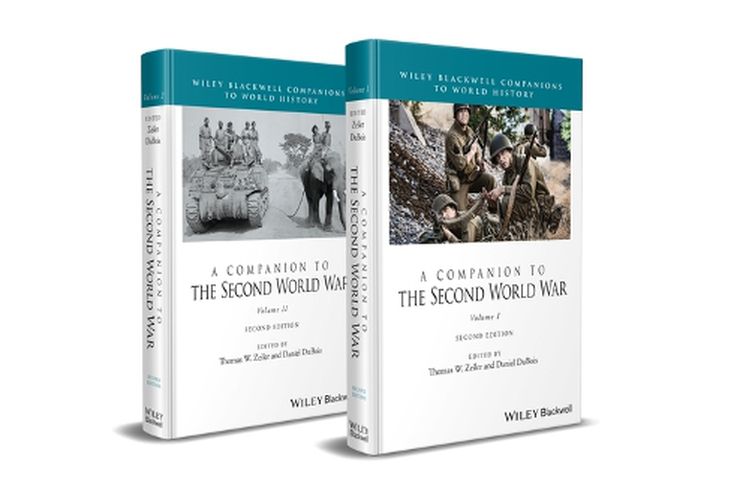Readings Newsletter
Become a Readings Member to make your shopping experience even easier.
Sign in or sign up for free!
You’re not far away from qualifying for FREE standard shipping within Australia
You’ve qualified for FREE standard shipping within Australia
The cart is loading…






Explores the evolving historiography of the Second World War across cultures and continents
A Companion to the Second World War, Second Edition is a foundational reference for understanding how scholars have interpreted, debated, and revised the history of the Second World War. Spanning two volumes and more than sixty essays, this extensively updated edition brings together leading voices in the field to examine the military, political, cultural, social, and economic dimensions of the war. The volume's expanded scope reflects the field's evolution, with new chapters dedicated to underrepresented areas of research, including Indigenous perspectives, gender and sexuality, religious responses, environmental dimensions, and digital cultural memory.
By combining rigorous historiographical analysis with global breadth, the second edition of the Companion enables readers to engage with both well-established topics and emerging areas that challenge conventional narratives. The second edition significantly expands and updates the original collection to reflect the latest developments in the field. New chapters introduce cutting-edge research on topics such as LGBTIQ+ communities during the war, Indigenous experiences across multiple continents, and the global religious responses to the conflict. The edition also breaks new ground with essays on the Tokyo War Crimes Trial, the historiography of the Marshall Plan, the role of video games in shaping popular memory, and the cultural significance of wartime cartoons and comics. Updated chapters revisit key subjects-including colonialism in Asia, European societies in wartime, and the environmental dimensions of the conflict-to incorporate new historiographical approaches and source material.
An essential resource for those seeking a critical guide to the field's historiography and its future directions, A Companion to the Second World War, Second Edition:
Offers a truly global perspective with chapters on Africa, the Caribbean, the Middle East, and the Pacific Situates key issues and developments within the broader trajectory of Second World War studies Provides updated analyses of key military strategies, campaigns, and international diplomacy Engages with evolving debates around war crimes, historical memory, and revisionism Highlights new historiographical approaches to economics, technology, and environmental impacts during the war Analyzes topics such as neutrality, colonialism, wartime societies, and postwar memory through fresh methodological and thematic lenses
Underscoring the dynamic and interdisciplinary nature of current scholarship in the field, A Companion to the Second World War, Second Edition is ideal for graduate students, researchers, and instructors in areas including modern history, international relations, and memory studies. It is also an indispensable reference for academic libraries and professionals in historical research, publishing, and curriculum development.
$9.00 standard shipping within Australia
FREE standard shipping within Australia for orders over $100.00
Express & International shipping calculated at checkout
Stock availability can be subject to change without notice. We recommend calling the shop or contacting our online team to check availability of low stock items. Please see our Shopping Online page for more details.
Explores the evolving historiography of the Second World War across cultures and continents
A Companion to the Second World War, Second Edition is a foundational reference for understanding how scholars have interpreted, debated, and revised the history of the Second World War. Spanning two volumes and more than sixty essays, this extensively updated edition brings together leading voices in the field to examine the military, political, cultural, social, and economic dimensions of the war. The volume's expanded scope reflects the field's evolution, with new chapters dedicated to underrepresented areas of research, including Indigenous perspectives, gender and sexuality, religious responses, environmental dimensions, and digital cultural memory.
By combining rigorous historiographical analysis with global breadth, the second edition of the Companion enables readers to engage with both well-established topics and emerging areas that challenge conventional narratives. The second edition significantly expands and updates the original collection to reflect the latest developments in the field. New chapters introduce cutting-edge research on topics such as LGBTIQ+ communities during the war, Indigenous experiences across multiple continents, and the global religious responses to the conflict. The edition also breaks new ground with essays on the Tokyo War Crimes Trial, the historiography of the Marshall Plan, the role of video games in shaping popular memory, and the cultural significance of wartime cartoons and comics. Updated chapters revisit key subjects-including colonialism in Asia, European societies in wartime, and the environmental dimensions of the conflict-to incorporate new historiographical approaches and source material.
An essential resource for those seeking a critical guide to the field's historiography and its future directions, A Companion to the Second World War, Second Edition:
Offers a truly global perspective with chapters on Africa, the Caribbean, the Middle East, and the Pacific Situates key issues and developments within the broader trajectory of Second World War studies Provides updated analyses of key military strategies, campaigns, and international diplomacy Engages with evolving debates around war crimes, historical memory, and revisionism Highlights new historiographical approaches to economics, technology, and environmental impacts during the war Analyzes topics such as neutrality, colonialism, wartime societies, and postwar memory through fresh methodological and thematic lenses
Underscoring the dynamic and interdisciplinary nature of current scholarship in the field, A Companion to the Second World War, Second Edition is ideal for graduate students, researchers, and instructors in areas including modern history, international relations, and memory studies. It is also an indispensable reference for academic libraries and professionals in historical research, publishing, and curriculum development.